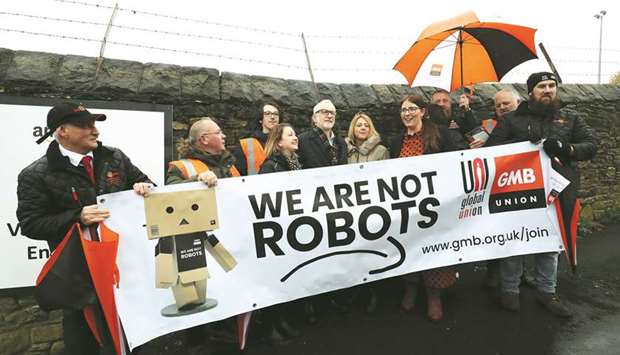Britain’s opposition Labour Party held a rally outside an Amazon depot yesterday as it highlights its promise to target multinational firms it accuses of dodging taxes and cheating workers should it win next month’s general election.
In its manifesto launched on Thursday, Labour unveiled a plan to spend almost £83bn ($106bn) on a programme of widespread nationalisation and free public services with the revenue coming from taxes on high earners and corporations.
Labour said its “Fair Tax Programme” would ensure the City of London financial district, big businesses and those who dodged tax paid their share.
“I’ll quite simply say this: if you’re trading in Britain and making money in Britain, pay your taxes in Britain, and that is exactly what we’re proposing,” Labour leader Jeremy Corbyn said outside the Amazon depot in Yorkshire, northern England.
In remarks published before his visit, Corbyn referred to a “tax and wage cheat” culture among multinationals.
“Of course we want jobs in this country, of course we want people working in this country,” Corbyn said. “What is a problem is if they decide to domicile their company somewhere else in order to pay tax at somebody else’s tax rate, and that ends up underfunding our public services.”
Amazon rebutted Labour’s comments.
“The government wrote the tax laws and they are designed to encourage investment, and we are investing heavily in creating jobs and infrastructure across the UK – more than £18bn ($23bn) since 2010,” an Amazon spokesman said.
Labour is lagging Prime Minister Boris Johnson’s Conservative Party by about 10 points or more in the polls but it hopes that targeting “vested interests” will win over voters ahead of the December 12 election.
“Jeremy Corbyn is lashing out at businesses because he is desperate to distract from the fact that he has no credible plan to get Brexit done,” Conservative chairman James Cleverly said.
The party has earmarked tech firms such as Amazon, Alphabet’s Google and Facebook for additional taxes, saying that it would bring in measures to stop multinationals avoiding tax through profit-shifting schemes.
It said this would bring in £6.3bn in 2023-4.
Other planned measures include establishing an inquiry into the finance sector, introducing a 20% Offshore Company Property Levy, and scrapping non-domiciled status, which allows some people resident in Britain to limit the tax they pay.
Taxation of multinational giants has become an international issue since Reuters revealed in 2012 how companies like Amazon and Starbucks use inter-company payments to lower tax liabilities.
Other countries have already introduced taxes on digital companies – France for instance applies a 3% levy to revenue from digital services earned by firms with more than €25mn in French revenue and €750mn ($830mn) worldwide.
US President Donald Trump has described such taxes as “foolishness”.

Corbyn poses with people holding a banner outside Amazon’s depot in Sheffield.
